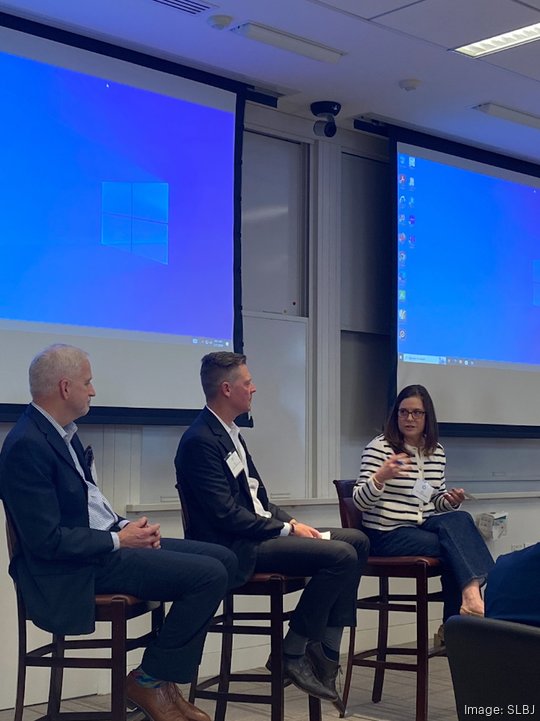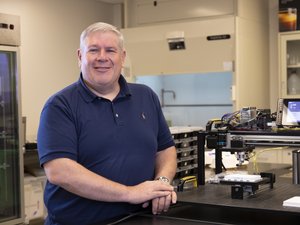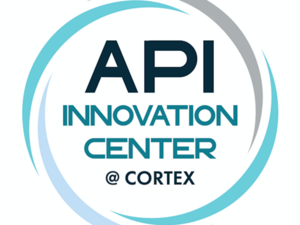
A newly formed St. Louis nonprofit has launched with a mission to connect geospatial research with commercial opportunities.
The new nonprofit, the Taylor Geospatial Engine (TGE), on Tuesday kicked off the first program it’s started in its goal to bring early stage R&D initiatives to the broader geospatial industry. TGE’s first program, Innovation Bridge, will bring together academics, businesses, government and non-governmental entities to work together around a “geospatial industry gap.”
TGE has begun operations with a founding investment from Andy Taylor, executive chairman of Clayton-based rental car giant Enterprise Mobility. The amount of funding pledged by Taylor, also a member of the ownership of Major League Soccer franchise St. Louis City SC, was not disclosed. TGE is led by Executive Director Jen Marcus, who previously was vice president of U.S. government at San Francisco-based satellite imagery firm Planet.
TGE is the latest local entity to launch with a focus on bolstering the region’s capabilities around geospatial technology, which involves the collection and analysis of data involving location. That investment comes as the National Geospatial-Intelligence Agency (NGA) builds a new $1.7 billion western headquarters, slated to open in 2026, in north St. Louis. It has included the start of GeoFutures, an initiative of business group Greater St. Louis Inc. that formed in October 2019 to boost the region’s geospatial sector and in June 2020 released a report aimed at providing a blueprint on how St. Louis can advance that mission.
TGE’s launch comes about two years after the founding in 2022 of the Taylor Geospatial Institute, also started with funding from the Taylor family. TGI includes eight regional research institutions as members and aims to expand St. Louis’ position as a hub of geospatial research and innovation. While TGE and TGI are separate, stand-alone entities, TGE describes itself as a sister organization of TGI and said TGI is its flagship partner as it seeks to identify innovation with commercial potential.
“The success of the engine is one of the criteria of the success of the institute and I think to me this is the power of St. Louis. We don’t have the bubbles of academia, industry and government. We’re generally all here together,” Nadine Alameh, executive director of TGI, said Tuesday during TGE’s launch event at Washington University.
The first iteration of TGE’s Innovation Bridge program is called the Field Boundary Initiative. Marcus said it will focus on using satellite imagery, cloud data sharing and machine learning for agricultural data sets. Marcus said the goal of Innovation Bridge is, as its name implies, to bridge together academics and researchers with the broader geospatial industry to better work together to understand how R&D efforts connect with industry needs.
“We’re bringing experts together to see where is the state of industry and how can we all work together to have the academic community shifted toward the industry need. Not to change what they are doing but to make sure that they understand and have a closer voice of industry, and to have industry have a closer idea of the capabilities and the actual innovation that’s coming out,” Marcus said.
The Innovation Bridge program will focus on particular topics in the geospatial industry, and each iteration of the program will last about six to nine months, providing seed funding to help advance technologies. The program will seek to source innovations from members of TGI, as well as other researchers and early stage companies. Other participants will include businesses, government entities and non-governmental organizations. Marcus said she expects the Innovation Bridge program to help companies reduce the time and cost it takes to find and vet new technologies.
“I know from experience just saying 'there’s a thing over there, let’s go buy it' is not what happens. What happens is you’ve got to really dig into the problems and get to know the people,” she said.
TGE is hosting a workshop this week in St. Louis to begin its first Innovation Bridge program. It includes several participants who have traveled from outside the St. Louis region and organizations involved in the program include Bayer AG, World Resources Institute and Microsoft’s AI for Good Lab, among others.
While TGE is beginning its program with Innovation Bridge, Marcus said the new nonprofit organization will “absolutely add on other programs” in the future focused on commercialization.
In addition to Marcus, TGE’s leadership includes three board members: Chairman Robert Cardillo, former director of NGA; Treasurer Jason Thein, chief operating officer and general counsel for St. Louis City SC; and Secretary Ken Olliff, vice president for research and partnerships at Saint Louis University.
TGE is currently in the process of hiring a program manager and associate for its sourcing innovation team.











